How to configure TCP/IP Properties of the Wireless Connection on my computer (Windows XP,Vista,7,8,10,Mac)?
Choose your computer’s operating system.
Step 1
Click Start->Control Panel->select and double click Network and internet connections->select and double click Network Connections.
Step 2
Select Wireless Network Connection, right click it and select Properties.
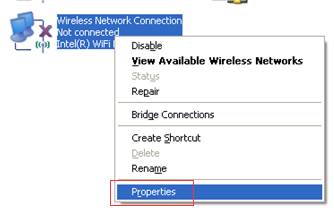
Highlight Internet Protocol (TCP/IP) tab in the Wireless Network Connection Properties window that appears:
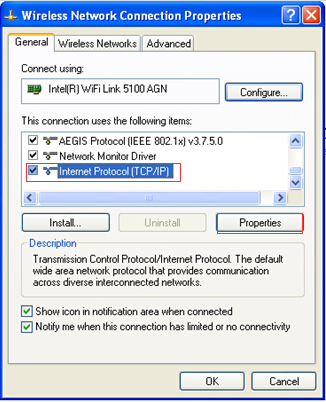
Step 3
Double click it or click Properties. The TCP/IP Properties window will display.
Step 4
Now you have two ways to configure the TCP/IP protocol below:
1. Assigned by DHCP Sever
Select Obtain an IP address automatically and Obtain DNS Server address automatically, as shown in the figure below. These may be selected by default. Then click OK to save setting.
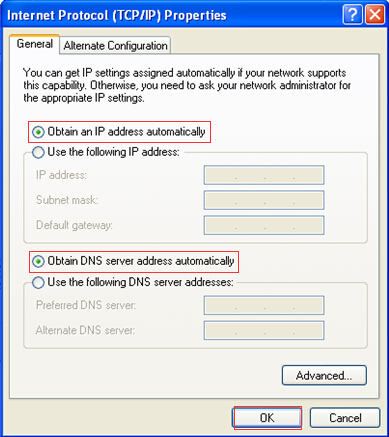
2. Assigned manually
1) Select Use the following IP address, as shown in the following figure.
If the router’s LAN IP address is 192.168.0.1, please type in IP address 192.168.0.x (x is from 2 to 253), subnet mask 255.255.255.0, and default gateway 192.168.0.1.
2) Select Use the following DNS server addresses, as shown in the following figure. And then type the DNS server IP address, which should be provided by your ISP. Finally remember to click OK to save settings.
Note: In most cases, type your local area DNS server IP addresses into it.
The Preferred DNS server is same to default gateway. For Secondary DNS server, you could leave it blank or type in 8.8.8.8.
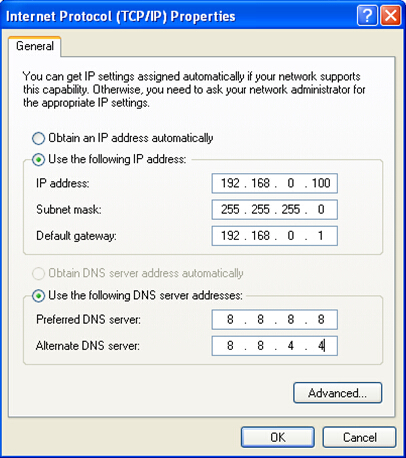
Step 5
Click OK and OK again to save and apply your settings.
Step 1
Click on windows key+ R key on the keyboard at the same time.
Step 2
Type ncpa.cpl in the box, then press OK.
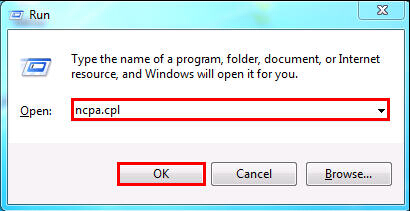
Step 3
Select the Wireless Network Connection, right click it and select Properties
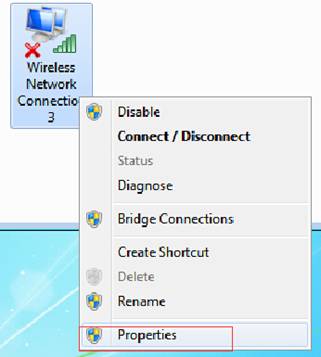
Step 4
Select Internet Protocol Version 4(TCP/IPv4), double click it or click Properties.
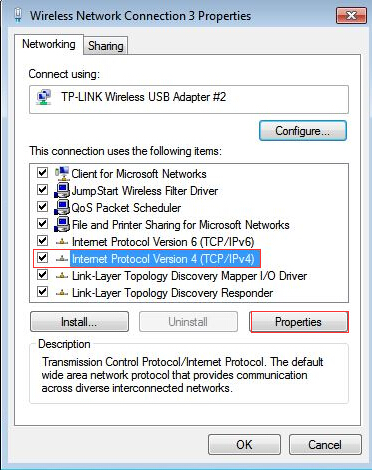
Step 5
There are two ways to configure the TCP/IP Properties, Assigned by DHCP server automatically or manually.
1. Assigned by DHCP server
Select Obtain an IP address automatically and Obtain DNS server address automatically. If necessary, then click OK to save the settings.
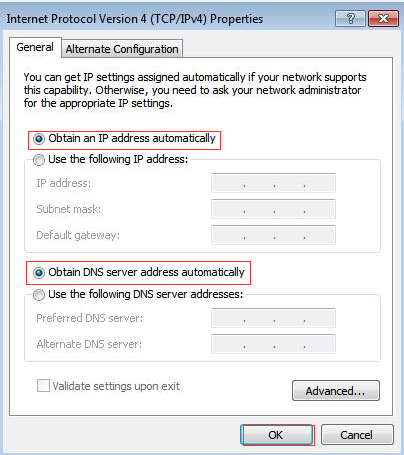
2. Assigned manually
1) Select Use the following IP address, type IP address, subnet mask and default gateway IP address into it.
If the router’s LAN IP address is 192.168.0.1, please type in IP address 192.168.0.x (x is from 2 to 253), subnet mask 255.255.255.0, and default gateway 192.168.0.1.
2) Select Use the following DNS server addresses, as shown in the following figure. And then type the DNS server IP address, which should be provided by your ISP. If necessary, then click OK to save the settings.
Note: In most cases, type your local area DNS server IP addresses into it.
The Preferred DNS server is same to default gateway. For Secondary DNS server, you could leave it blank or type in 8.8.8.8.
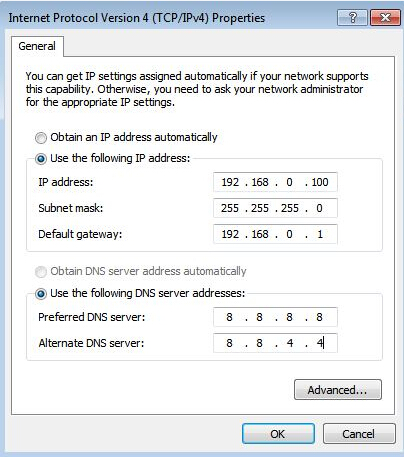
Step 6
Click OK and OK again to save and apply your settings.
Step 1 Go to Control Panel.
Here we will illustrate different ways to find control panel on Windows 8.
1) Press “Windows key  +F”, a search box will come out, please input control panel and press enter;
+F”, a search box will come out, please input control panel and press enter;
 +F”, a search box will come out, please input control panel and press enter;
+F”, a search box will come out, please input control panel and press enter;2)Press “Windows key+ R”, then there will be a “run” box, input control panel and press enter;
3) Press “Windows key +X”, and click on “control panel”;
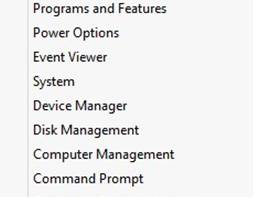
4) You can also input “control panel” in the search bar on the right-hand side of the screen.
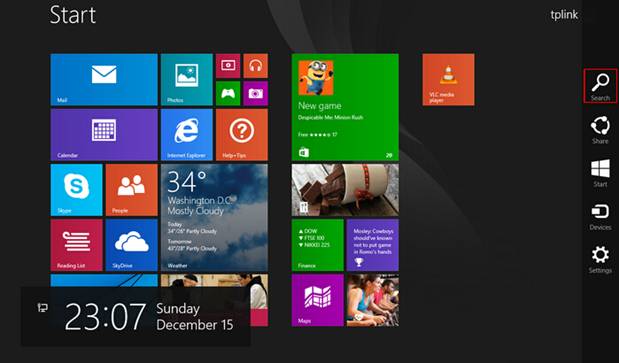
To check the IP address of the computer, please click on “Network and Internet→Network and Sharing Center→Change Adapter Settings (on the left)”;
Step 2
Right click on “Wi-Fi”, go to “Properties”, and then choose “Internet Protocol Version 4”, click on Properties;
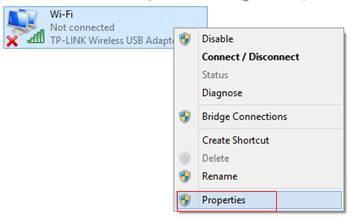
Step 3
Select Internet Protocol Version 4(TCP/IPv4), double click it or click Properties.
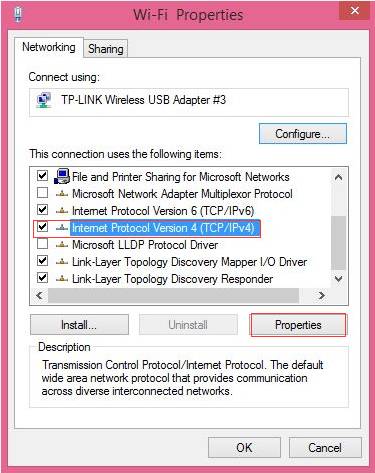
Step 4
There are two ways to configure the TCP/IP Properties, Assigned by DHCP server automatically or manually.
1. Assigned by DHCP server
Select Obtain an IP address automatically and Obtain DNS server address automatically. If necessary, then click OK to save the settings.
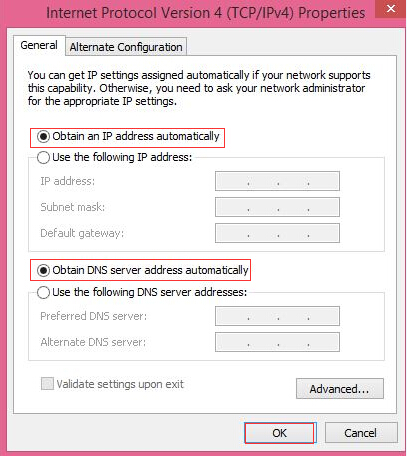
2. Assigned manually
1) Select Use the following IP address, type IP address, subnet mask and default gateway IP address into it.
If the router’s LAN IP address is 192.168.0.1, please type in IP address 192.168.0.x (x is from 2 to 253), subnet mask 255.255.255.0, and default gateway 192.168.0.1.
2) Select Use the following DNS server addresses, as shown in the following figure. And then type the DNS server IP address, which should be provided by your ISP. If necessary, then click OK to save the settings.
Note: In most cases, type your local area DNS server IP addresses into it.
The Preferred DNS server is same to default gateway. For Secondary DNS server, you could leave it blank or type in 8.8.8.8.
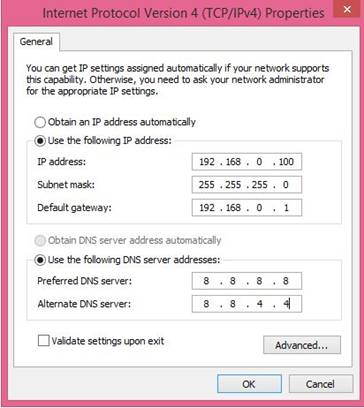
Step 5
Click OK and OK again to save and apply your settings.
Step 1
Click the Apple menu -->select System Preferences-> Network.
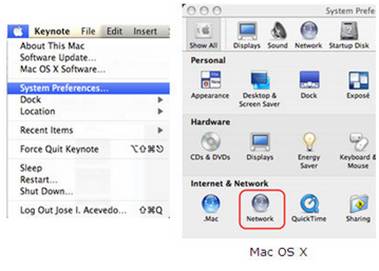
Step 2
Under the Network screen, please select Wi-Fi, and then click Advanced.
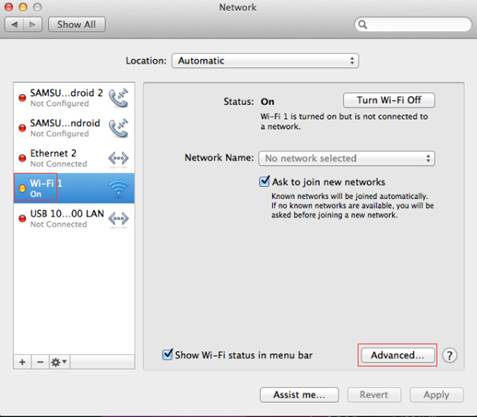
Step 3
Then go to TCP/IP on the top tab.
Input the Configure IPv4 field, you have four ways to configure the IPv4 below:
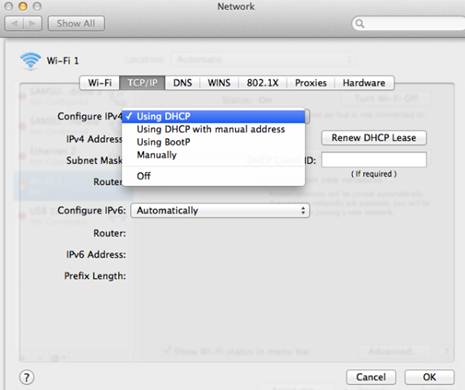
1) Select Using DHCP, then hit OK and hit OK and Apply to save the changes.
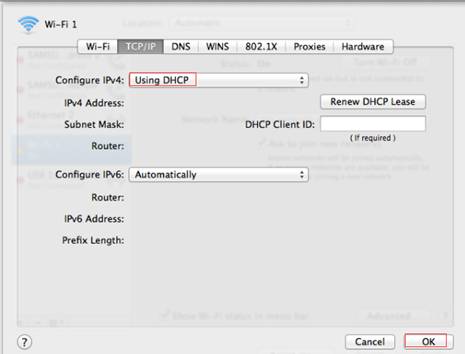
2) Select using DHCP with manual address.
If the router’s LAN IP address is 192.168.0.1, please type in IP address 192.168.0.x (x is from 2 to 253)
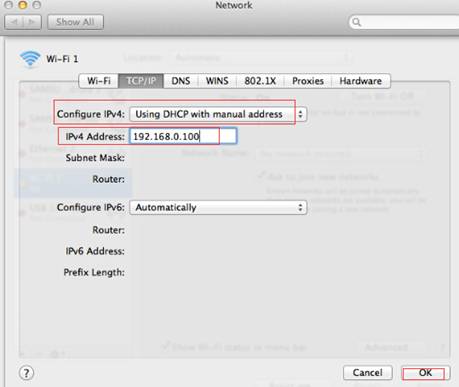
3) Select "Using BootP", and then fill in the parameters you need. Please don’t select it if it’s unnecessary.
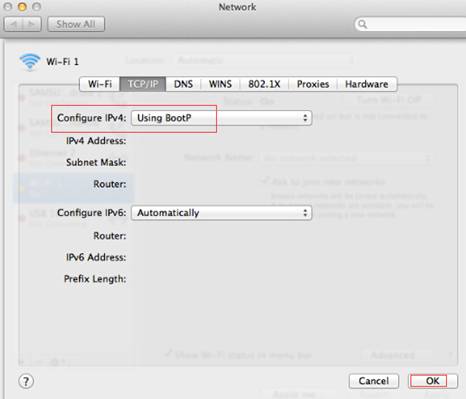
4) Select "Manually", and then fill in the parameters like below. If necessary, then click OK and Apply.
If the router’s LAN IP address is 192.168.0.1, please type in IP address 192.168.0.x (x is from 2 to 253), subnet mask 255.255.255.0, and default gateway 192.168.0.1.
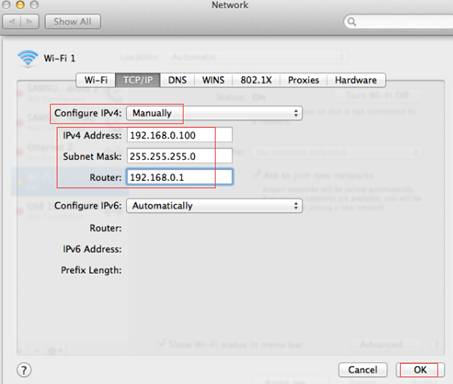
If you want to configure the DNS manually, please click DNS ->click “+” ->type the DNS address -> click OK.
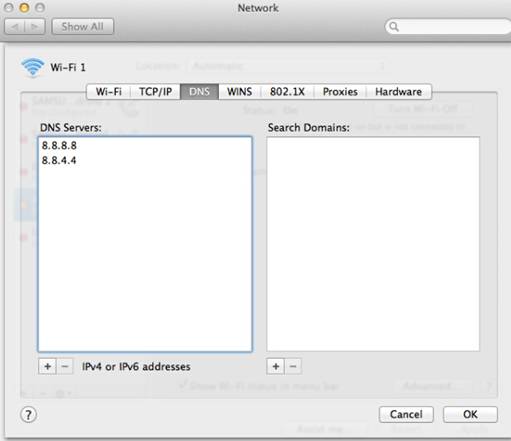
Note:
1. DNS server should be provided by your ISP. Please contact with your ISP to check them.
2. In most cases, you could type your local area DNS server IP addresses into it. The DNS server is same to Router LAN IP address. In some cases, you could also leave it blank or type in 8.8.8.8.
Is this faq useful?
Your feedback helps improve this site.
TP-Link Community
Still need help? Search for answers, ask questions, and get help from TP-Link experts and other users around the world.





